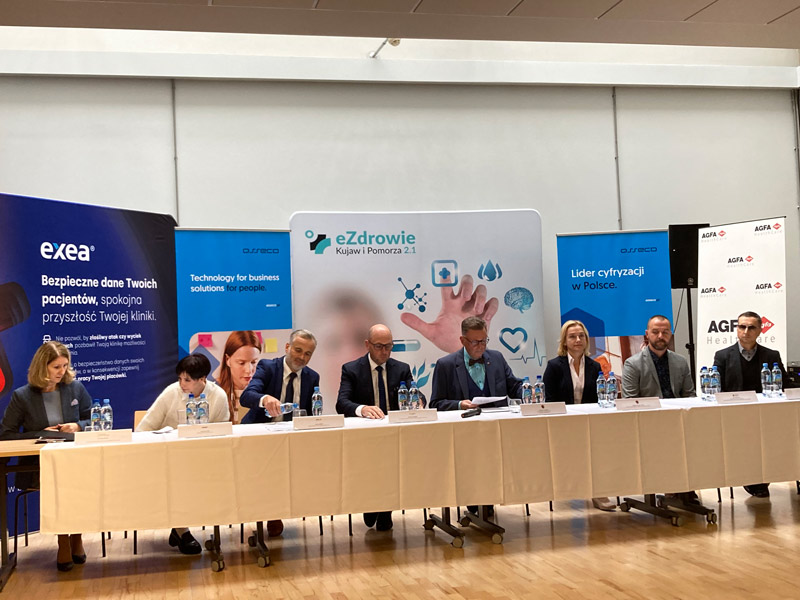Digital revolution in Kujawsko-Pomorskie hospitals

Launch of the Regional Repository of Electronic Medical Records implemented by Asseco and AGFA HealthCare
Asseco, AGFA HealthCare and the Kujawsko-Pomorskie Center for Digital Competence have implemented the Regional Repository of Electronic Medical Records in the Kujawsko-Pomorskie voivodeship. The scope of the project included the digital connection of 15 hospitals, where doctors issue more than one million medical documents and perform 400,000 imaging examinations annually. Thanks to the introduced solutions such as e-Registration and the Patient Portal, patients gained quick access to their results, and the facilities have now comprehensive tools for managing the unit and offering e-Services.
Electronic medical records are becoming one of the key elements in the digitization of Polish health care. The collection, processing, storage and sharing of e-documentation translates into an increase in the level of patient service and significantly improves the work of personnel. The Regional Repository of Electronic Medical Records is a project that enables the implementation of the above functionalities at the regional and local levels. Its scope includes health care units for which the leading body is the Local Government of the Kujawsko-Pomorskie voivodeship and University Hospitals.
Digitalization in support of health
Asseco Poland, in cooperation with AGFA HealthCare, has built and implemented the EDM (Electronic Medical Records) system that allows the transfer and sharing of e-documentation of medical records and DICOM imaging studies. The system also offers a wide range of electronic services common to hospitals, such as e-Registration, emergency data, e-Patient Logbook and Patient Portal. In addition, it provides the ability for doctors from different units in the region to conduct e-Consultations, and meets statutory requirements for EDM.
„Today, a supportive IT partner can significantly empower healthcare entities to achieve increasingly ambitious digital service delivery goals. The Regional Repository of Electronic Medical Records project has connected 15 hospitals through the Patient Portal and EDM in the cloud. The cloud computing technology on which the solution is based addresses the current challenges of the increasing use of medical event reporting, increases accessibility to patient records produced within the hospitals, and guarantees their security while meeting regulatory requirements. In addition, the system offers a full range of e-services that enhance the comfort of staff, as well as improve the patient experience. In implementing the new solutions, we have also provided full technical and factual support” – said Dariusz Śliwowski, Deputy Director of the Healthcare Division, Asseco Poland.
„Thanks to the solutions used in the Regional Repository of Electronic Medical Records project, Polish doctors get access to the most modern solutions for searching, sharing, archiving medical image data in the world. In addition, thanks to e-Consultation, for the first time in Poland we enable remote medical consultation of DICOM images in the diagnostic standard. Both solutions significantly contribute to the improvement of diagnostic processes in the Kujawsko-Pomorskie voivodeship. The possibility of quick consultation of imaging studies for doctors of various specialties from different hospitals will increase the level of patient safety and the comfort of doctors' work” - emphasised Paweł Mańdok, President of AGFA HealthCare in Poland.

Advantage through the cloud
The creation of the Regional Repository of Electronic Medical Records brings numerous benefits. First and foremost, it introduces comprehensive, shared processing and delivery of medical services among hospitals in a cloud model, which translates into significant savings, and provides easy access to medical records and imaging studies. In addition, the system enables immediate exchange of EMD between hospitals in the region, which increases the availability of the service and guarantees its continuity. The entire process is carried out with the highest standards of data security, backups of which are stored in separate locations, so they can be recovered, for example, in the event of a server room failure.
The extensive digitization process is a challenge for large hospitals as well as small and mid-sized entities. They need the right partners who will not only guarantee efficient data management, but also properly secure it.
